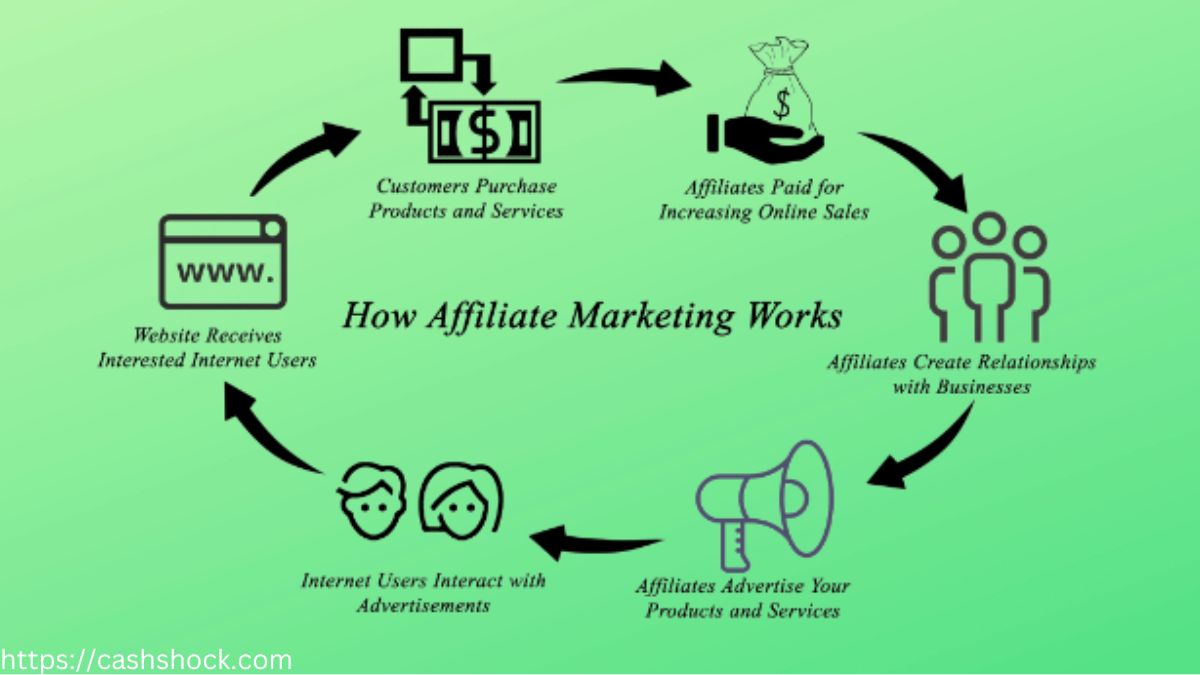Affiliate Marketing Process: Beginners Step by Step Guide

Understanding the Affiliate Marketing Process
Affiliate Marketing Process is a profitable strategy for both people and companies. At its core, affiliate marketing involves a symbiotic relationship between merchants and affiliates. Merchants leverage affiliates to promote their products or services, while affiliates earn a commission for every sale or lead generated through their marketing efforts.
The Role of Merchants
Merchants, also known as advertisers or vendors, are the creators or sellers of products or services. These entities rely on affiliates to drive traffic to their offers, ultimately leading to conversions. The Affiliate Marketing Process Merchants provide affiliates with unique tracking links or codes to monitor the performance of their marketing campaigns accurately.
The Affiliate Marketing Process The Role of Affiliates

Affiliates, on the other hand, act as intermediaries between merchants and consumers. Affiliates promote products or services through various channels, such as websites, social media, email marketing, or influencer partnerships. Successful affiliates employ strategic marketing tactics to attract targeted traffic and compel users to make a purchase or complete a desired action.
The Affiliate Marketing Process Unveiled
1. Research and Select a Niche
Before diving into affiliate marketing, it’s crucial to identify a niche that aligns with your interests, expertise, and target audience’s needs. Conduct thorough market research to assess the demand, competition, and profitability of potential niches. Choosing a niche with sufficient demand and relatively low competition increases your chances of success in the long run.
2. The Affiliate Marketing Process Choose the Right Affiliate Programs
Once you’ve identified your niche, the next step is to select reputable affiliate programs that offer products or services relevant to your audience. Consider factors such as commission rates. The Affiliate Marketing Process includes cookie duration, payment terms, and the merchant’s reputation when evaluating affiliate programs. Opt for programs that provide adequate support, resources, and marketing materials to help you succeed.
3. Build a Professional Website or Platform
Your website or platform serves as the primary hub for your affiliate marketing activities. Invest time and effort in creating a professional, user-friendly website that showcases your chosen niche and promotes affiliate products effectively. Optimize your website for search engines (SEO) to attract organic traffic and improve visibility in search results.
4. Create Compelling Content
Develop high-quality, engaging content that educates, entertains, or solves problems for your target audience. Incorporate affiliate links naturally within your content, ensuring relevance and transparency to avoid appearing overly promotional. Experiment with various content formats, such as blog posts, videos, podcasts, or social media posts, to diversify your marketing efforts.
5. Drive Targeted Traffic
Generating targeted traffic is essential for affiliate marketing success. Implement a multi-channel marketing strategy to reach your audience across different platforms and channels. Leverage search engine optimization (SEO), social media marketing, email marketing, paid advertising, and influencers. The Affiliate Marketing Process partnerships to drive qualified traffic to your affiliate offers. Monitor and analyze the performance of each channel to optimize your marketing campaigns continually.
6. Nurture Relationships and Build Trust
Focus on providing value, addressing their needs, and fostering genuine connections through your content and interactions. Establish yourself as a trusted authority within your niche by consistently delivering valuable insights, recommendations, and solutions. Engage with your audience through comments, emails, or social media to cultivate lasting relationships and encourage repeat engagement.
7. The Affiliate Marketing Process Track, Analyze, and Optimize
Continuous monitoring and optimization are essential to maximize your affiliate marketing efforts’ effectiveness. Track key performance metrics, such as clicks, conversions, revenue, and ROI, using analytics tools and affiliate tracking platforms. Identify areas for improvement, such as underperforming campaigns or low-converting landing pages, and make data-driven adjustments to optimize your strategies for better results.
The Affiliate Marketing Process Advanced Strategies
Leveraging Advanced Tactics for Optimal Results

While the foundational principles of affiliate marketing remain constant, staying ahead of the curve requires embracing advanced strategies and tactics to outperform competitors and maximize revenue potential. In this section, we’ll explore some advanced techniques to elevate your affiliate marketing game and achieve unparalleled success.
1. Harness the Power of Data Analytics
In today’s data-driven world, leveraging analytics is essential for optimizing your affiliate marketing campaigns. Dive deep into analytics tools to gain insights into user behavior, preferences, and conversion patterns. Identify high-performing keywords, demographics, and traffic sources to refine your targeting and allocate resources effectively. Use A/B testing to experiment with different strategies and determine the most effective approaches for driving conversions.
2. Implement Retargeting and Remarketing Campaigns
Retargeting and remarketing campaigns are powerful tools for re-engaging users who have previously interacted with your website or affiliate offers. The Affiliate Marketing Process utilizes pixel tracking and cookies to segment your audience based on their behavior and preferences. Tailor personalized ads or offers to rekindle their interest and encourage them to complete their purchase or conversion journey. Implement dynamic retargeting ads to display products or services based on the user’s browsing history, increasing relevancy and conversion rates.
3. The Affiliate Marketing Process Explore Advanced SEO Techniques
Search engine optimization (SEO) is the backbone of organic traffic generation in affiliate marketing. Stay updated on the latest SEO trends and algorithms to maintain your website’s visibility and rankings in search engine results pages (SERPs). Experiment with advanced SEO techniques such as schema markup, featured snippets optimization, and voice search optimization to enhance your website’s relevance and authority. Focus on long-tail keywords and semantic search queries to capture highly targeted traffic with lower competition.
4. The Affiliate Marketing Process Leverage Influencer Marketing Collaborations
Influencer marketing has emerged as a dominant force in the digital landscape, offering unparalleled reach and credibility with niche audiences. Partner with influencers or micro-influencers who resonate with your target demographic and align with your brand values. Collaborate on sponsored content, product reviews, or endorsements to leverage their authority and influence. Track influencer’s performance metrics, such as engagement rate and audience demographics. The Affiliate Marketing Process to evaluate the effectiveness of your partnerships and optimize future collaborations.
5. Dive into Affiliate Automation and Scaling
Streamline your affiliate marketing operations and scale your efforts by leveraging automation tools and technology solutions. Utilize affiliate management platforms to automate tasks such as link tracking, commission tracking, and payout management. Implement email marketing automation to nurture leads, and segment audiences. The Affiliate Marketing Process and deliver personalized content or offers based on user interactions. Explore opportunities for outsourcing or delegating repetitive tasks to virtual assistants or freelancers, allowing you to focus on high-value activities and strategic growth initiatives.
Conclusion:
Elevate Your Affiliate Marketing Game By embracing advanced strategies and tactics, you can elevate your affiliate marketing game and achieve unprecedented success in this competitive landscape. From harnessing the power of data analytics and implementing retargeting campaigns to exploring advanced SEO techniques and leveraging influencer marketing collaborations, there are myriad opportunities to drive growth and maximize ROI in your affiliate marketing endeavors.
Learn More Here: Earning Money from Google




